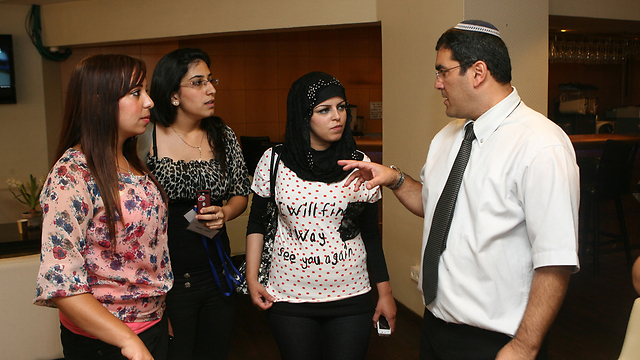
Controversial Hebrew ulpan opens in east Jerusalem
Some 100 people volunteer in east Jerusalem as part of national service, 20 of them study Hebrew at new ulpan. 'We have to use Hebrew in our everyday lives, it can help me,' says Arab ulpan student
Within the courses' framework, the national service volunteers learn spoken Hebrew, which helps them eliminate the language barriers both in their service and afterwards when they wish to integrate within Israeli higher education or workplaces.
Related stories:
- Streisand to sing to Israelis in Hebrew
- Israeli nursing guide big hit in Arab world
- Egyptian Hebrew speakers take Israeli public by storm
"I signed up to the ulpan since we have to use Hebrew in our everyday lives, and because I want to go on and study at the Hebrew University. It can help me," said Biga Shirawi, a resident of east Jerusalem who takes part in the course and volunteers as part of a civilian service at a library in one of the city's Arab neighborhoods.
According to her, she received mixed reactions regarding her civil service and Hebrew studies from those around her, but she refuses to let it get to her: "People are puzzled and ask me why I'm doing it, and I respond it is a mistake to see this as negative, and that every person should do what they see fit for them."
The first ulpan class was initiated by the Civil and National Service Administration (Sherut Leumi) and is held in Wadi Joz neighborhood. The classroom, of which the location was concealed of fear of harassment, is attended by 20 students, and there are several others who are interested in signing up for it as well.
There are 97 volunteers serving in different public offices, medical institutions and non-profit organizations in east Jerusalem today. Eihab Kraka, the coordinator of the new ulpan, explained that the importance of learning the Hebrew language is extremely high for the pupils and can aid them a lot. He admitted there is great sensitivity regarding the issue due to those who oppose integration among all those who live in Israel.
"The ulpan students do not highlight the fact they're doing civil service and define it as a year of service to the Arab community, in order to avoid linking it as an alternative to military service in Israel. People in east Jerusalem are starting to realize that this service ultimately contributes to the community," Kraka said.
Sar-Shalom Gerbi, director of the Civil and National Service Administration, noted that this is a revolutionary step and that the Hebrew ulpan allows hundreds of volunteers from the Arab sector to be easily absorbed and quickly integrated within the Israeli society after their volunteering period.
You can contact Elior Levy, Ynet's Palestinian Affairs Correspondent, at: [email protected]
- Receive Ynetnews updates directly to your desktop











